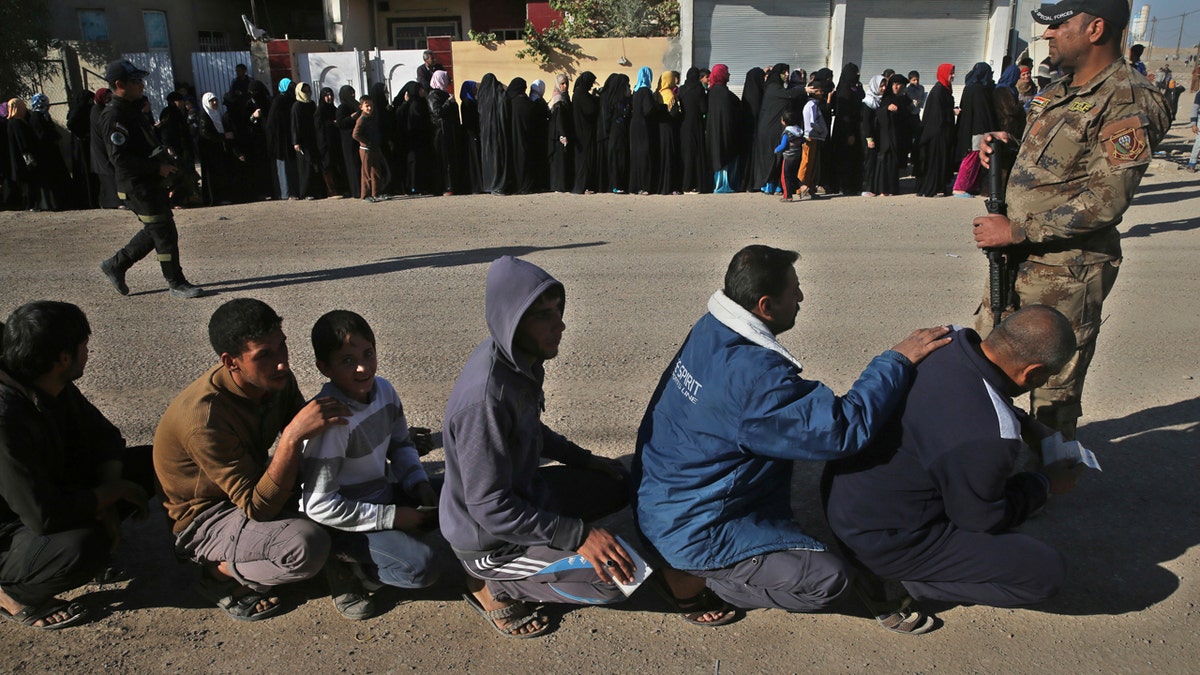
Iraqi citizens que to receive food supplies, at al-Arbajiyeh neighborhood, in Mosul, Iraq, Saturday, Nov. 19, 2016. (The Associated Press)
MOSUL, Iraq – Iraqi troops advanced against Islamic State fighters toward the center of Mosul on Sunday, but were slowed down by sniper fire and suicide bombings as well as concern over the safety of civilians in a city that is home to more than 1 million people.
A few hundred civilians emerged from rubble-strewn front-line neighborhoods in search of safer ground, including women and children, some of them carrying bags or small suitcases.
Maj. Gen. Sami al-Aridi told The Associated Press that his special forces were searching homes in areas retaken from IS, looking for militants and vehicles rigged with explosives. Troops in those areas continue to be hit by mortar and sniper fire, he said.
Another Iraqi army commander, Brig. Gen. Haider Fadhil, said four civilians were killed and another four wounded when a suicide car bomb exploded before it could reach the troops it was targeting late Saturday.
The troops laid siege Sunday to the Al-Zohour neighborhood, about eight kilometers (five miles) from the city center. The arrival of the troops at the neighborhood's fringes prompted hundreds of civilians to emerge from their homes waving white flags.
"The biggest hindrance to us is the civilians, whose presence is slowing us down," al-Aridi said. "We are soldiers who are not trained to carry out humanitarian tasks."
The Iraqi military began the campaign one month ago to retake Mosul, Iraq's second largest city and the extremist group's last major urban bastion in the country. Most gains have been made by the special forces operating in the section of Mosul east of the Tigris river. Other forces are advancing on the city from different directions, and the U.S.-led coalition is providing airstrikes and other support.
IS captured Mosul in the summer of 2014 as part of a blitz that placed nearly a third of Iraq under their control. Iraqi troops, federal police and allied Shiite and Sunni militias have over the past year pushed IS militants from most of the vast Sunni province of Anbar, west of Baghdad, and areas to the north and east of the Iraqi capital.
Army troops have arrived on the outskirts of Tal Afar, west of Mosul, to reinforce state-sanctioned Shiite militias, who have captured the town's airport and are preparing to retake the town, according to two senior militia officials. They spoke on condition of anonymity because they were not authorized to brief the media.
Prior to its capture by IS, Shiites constituted the majority of Tal Afar's estimated 200,000 residents.
Human Rights Watch said in a report Sunday that Sunni militiamen fighting alongside the Iraqi military detained and beat 22 men from villages near Mosul and recruited 10 children from displaced camps in the area to join the fight against IS.
"The Iraqi authorities should investigate any alleged acts of torture and cruel and inhuman treatment in custody and charge those responsible for war crimes, including anyone with command responsibility who should have known about the crimes and failed to take all reasonable measures to prevent them," said the New York-based advocacy group.
"The U.S. should press the Iraqi government to ensure that the troops they are supporting don't have fighters under 18 in their ranks," said Lama Fakih, HRW's deputy Middle East director.
In Baghdad, four separate bomb attacks targeted commercial areas on Sunday, killing at least 10 civilians and wounding 34, according to police and health officials, who spoke on condition of anonymity because they were not authorized to brief the media.
Baghdad has for more than a decade been the scene of near daily bomb attacks blamed on IS and other Sunni militants. There was no immediate claim of responsibility for any of Sunday's attacks.
